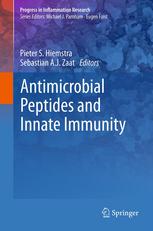Antimicrobial Peptides and Innate Immunity 2013
دانلود کتاب پزشکی پپتیدهای ضد میکروبی و ایمنی ذاتی
| نویسنده |
Pieter S. Hiemstra, Sebastian A. J. Zaat |
|---|
| تعداد صفحهها |
384 |
|---|---|
| نوع فایل |
|
| حجم |
5 Mb |
| سال انتشار |
2013 |
89,000 تومان
پپتیدهای ضد میکروبی موضوع تحقیقات شدید در دهههای گذشته بودهاند و در حال حاضر بخشی ضروری از سیستم دفاعی در باکتریها، گیاهان، حیوانات و انسانها محسوب میشوند. کتاب او بهروزرسانیای در مورد مولکولهای مؤثر سیستم ایمنی ذاتی برای محققانی که قبلاً به طور فعال در این منطقه درگیر هستند و برای کسانی که علاقه کلی به این موضوع دارند ارائه میکند.
کتاب با مروری بر تکامل پپتیدهای ضد میکروبی حاوی سیستئین (از جمله دفنسین ها) و نقش این پپتیدها در دفاع میزبان در گیاهان و میکروارگانیسم ها آغاز می شود. درک این موضوع که پپتیدهای ضد میکروبی نیز عملکردهای متمایز از عملکرد مستقیم ضد میکروبی خود را نشان می دهند، تمرکز فصل های بعدی است و این پپتیدها را در مرکز ایمنی و ترمیم زخم قرار می دهد. فصل های دیگر نقش پپتیدهای ضد میکروبی در بیماری را با ارائه یک نمای کلی از مکانیسم های مقاومت باکتریایی به پپتیدهای ضد میکروبی و بحث در مورد نقش آنها در بیماری التهابی روده، فیبروز کیستیک و بیماری انسدادی مزمن ریه مورد بحث قرار می دهند. در نهایت، این کتاب نشان می دهد که چگونه می توان از دانش عملکرد و تنظیم پپتیدهای ضد میکروبی برای طراحی درمان های جدید برای اختلالات التهابی و عفونی استفاده کرد. به دلیل افزایش مقاومت میکروارگانیسم ها به آنتی بیوتیک های معمولی، این یک حوزه تحقیقاتی بسیار مهم است. بنابراین استفاده از پپتیدهای مصنوعی یا نوترکیب یا عواملی که تولید درون زا پپتیدهای ضد میکروبی را تحریک می کنند، جایگزین جذابی برای آنتی بیوتیک های معمولی است.
Antimicrobial peptides have been the subject of intense research in the past decades, and are now considered as an essential part of the defense system in bacteria, plants, animals and humans. his book provides an update on these effector molecules of the innate immune system both for researchers who are already actively involved in the area, and for those with a general interest in the topic.
The book starts with an overview of the evolution of cysteine-containing antimicrobial peptides (including defensins), and the role of these peptides in host defense in plants and micro-organisms. The realization that antimicrobial peptides also display functions distinct from their direct antimicrobial action is the focus of the next chapters, and puts these peptides center stage in immunity and wound repair. Further chapters discuss the role of antimicrobial peptides in disease, by providing an overview of mechanisms in bacterial resistance to antimicrobial peptides and a discussion of their role in inflammatory bowel disease, cystic fibrosis lung disease and chronic obstructive pulmonary disease. Finally, the book shows how knowledge of the function of antimicrobial peptides and their regulation can be used to design new therapies for inflammatory and infectious disorders. This is a very important area of research because of the increase in resistance of micro-organisms to conventional antibiotics. Therefore the use of synthetic or recombinant peptides, or agents that stimulate the endogenous production of antimicrobial peptides, provides an attractive alternative for conventional antibiotics.




